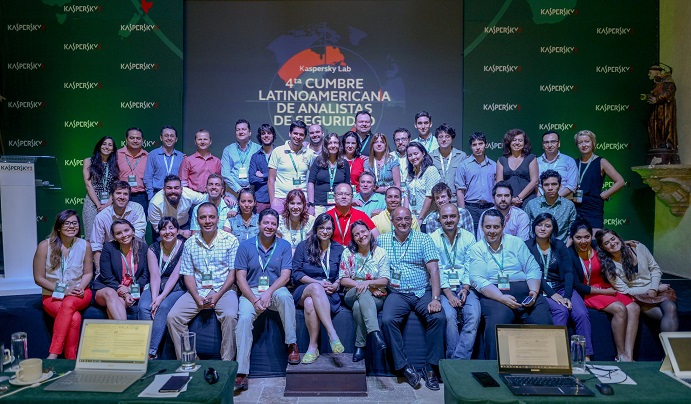On August 17-20, 2014, Kaspersky Lab held its fourth annual Latin American Security Analyst Summit in Cartagena, Colombia, to present and discuss the Latin American threat landscape and the latest analysis of cybercrime and security trends from around the world to journalists from 12 countries throughout the region.
On August 17-20, 2014, Kaspersky Lab held its fourth annual Latin American Security Analyst Summit in Cartagena, Colombia, to present and discuss the Latin American threat landscape and the latest analysis of cybercrime and security trends from around the world to journalists from 12 countries throughout the region. At the event, security analysts discussed the new techniques emerging among the region’s hackers, showcasing the way some of them work and demonstrating how Kaspersky Lab’s solutions, such as the recently launched Kaspersky Internet Security multi-device and the flagship Kaspersky Endpoint Security for Business platform, neutralize all these IT-dangers.

“In today’s hyper-connected life, cyber-threats are developing almost as quickly as the technologies themselves. It was just 10 years ago that we discovered the first mobile virus; now we already see threats using web cameras as well as the most sophisticated banking Trojans capable of bypassing even two-factor authentications with tokens and so on. Our goal is to anticipate and alert people to emerging threats, particularly those associated with new technologies like connected cars or wearable devices, and to protect users from them,” said Dmitry Bestuzhev, Head of the Global Research and Analysis Team in Latin America, Kaspersky Lab.
Dmitry Bestuzhev delivered the keynote speech, presenting an overview of current global and local cyber-threats and focusing on targeted espionage campaigns in Latin America. He concluded that the region’s cybercriminals have developed the means to conduct more sophisticated attacks than before and have adopted the practices of their predecessors and counterparts from other countries. During his presentation he revealed that users in Brazil suffered the most from cyber-threats during the first half of 2014 (with up to 29,6% of users being affected by online threats and up to 43% - by local threats associated with local computers, pen drives and network drives). Peru and Mexico were second and third on the list of countries under threat.
“More than 28 million cyber-attacks and infection attempts were neutralized by Kaspersky Lab’s products on the PCs and mobile devices of users in Latin America during first six months of 2014. This includes quite a number that involves previously unknown malware that was blocked by company’s proactive technologies. So it is important for people to use reliable security solutions and remember to be cautious”, Dmitry Bestuzhev added.
Fabio Assolini, Senior Malware Analyst, Global Research and Analysis Team, Kaspersky Lab, analyzed the influence of Eastern Europe’s cybercrime on the Latin American scene while discussing online banking attacks. He focused on the booming evolution of attacks on financial transactions seen on the internet and mobile services in the region and looked at how financial institutions should protect their customers in line with the best global practices.
Privacy concerns are a hot topic when it comes to wearable devices. Roberto Martinez, Security Researcher, and Juan Andrés Guerrero, Senior Security Researcher, both of the Global Research & Analysis Team, Kaspersky Lab, focused on this. Attack vectors targeting wearable technology are likely to go entirely unnoticed due to their minimalist interface. In effect they could transform these gadgets into a perfect tracking device, capable of recording and quietly stealing critical and sensitive information about users and their surroundings. The security experts discussed whether wearable technology in its current implementation is really a fulfillment of our sci-fi dreams or just an emergent nightmare for early-adopters.
Santiago Pontiroli, Security Analyst, Global Research & Analysis Team, Kaspersky Lab, followed with a presentation that pointed out that today there are more mobile devices in use than there are people on Earth. Not surprisingly, cybercriminals are watching this closely, and looking to make a profitable future from smartphones, tablets and other intelligent devices. His presentation highlighted the current mobile environment and its relation to cloud services as potential vectors of attack. Because these services being available at any time, he explained, the data needs constant protection against attack.
The growing market of personal or corporate data exchange has provoked the development of sophisticated and technologically advanced malware, capable of the unauthorized extraction of information from user devices. In his second presentation Roberto Martinez revealed how cybercriminals, and even people with ulterior personal motives, infect unsuspecting victims with malware that grants them remote access to their devices’ cameras. The malware allows them to activate the photo and video features of the device without the victim ever knowing he or she is being watched or filmed. This presentation highlighted how malware such as BlackShade works and demonstrated the new technologies included in Kaspersky Internet Security 2015, such as WebCam Protection, that are warding off attempts to gain unauthorized access to webcams.
Jaime Blasco, Director, Group of Vulnerability Research, at AlienVault Labs and a guest speaker at the event, gave a detailed explanation of advanced persistent threats, dissecting the different methods of infection such campaigns use, their targets and the different objectives that fuel such attacks.
The summit closed with Dmitry Bestuzhev’s presentation of the Machete cyberespionage campaign and its operations centered on several Latin American countries. Code named after a popular weapon in the region, Machete has been targeting high profile victims, including government, military, law enforcement agencies and embassies for at least four years with the objective of hijacking sensitive information from the compromised organizations.
